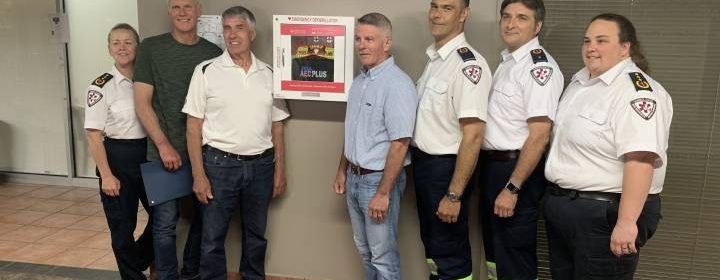‘Very glad to be here’: P.E.I. man credits bystanders, defibrillator after on-ice collapse

A Prince Edward Island man has been able to thank the bystanders and first responders who saved his life at a Moncton hockey rink last winter.
Jamie Richards, 73, says he’s still alive thanks to the quick actions of those around him and a defibrillator.
“I just had a heart attack and I was very, very glad to be still alive,” he told reporters at an event promoting the importance of having a defibrillator or AED (automated external defibrillator).
Jamie Richards collapsed mid-game during a hockey tournament at the Superior Propane Centre in Moncton in February
The device can analyze someone’s heart rhythm and provide a shock in efforts to restart the heart if it stopped beating.
“Jamie went down,” says Laurie Wood, who is a firefighter that was in attendance at the February hockey game. “I could tell the way he went down that this was serious – this might be ‘the big one.’”
Richards says it was his 39th year in the tournament at the Superior Propane Centre, but he doesn’t remember much from the first game of this year’s rendition Feb. 15.
“I don’t have much recollection. All I remember is I was on the ice on a shift and I got dizzy,” he said. “I do remember just going aboard the ambulance and then four or five hours later, I was sitting up in the hospital bed having something to eat when my wife walked in.”
Richards says much like the sport he was playing, it was a team effort to bring him back to life.
He was able to thank those who saved his life Thursday. Bystanders, including two firefighters, were able to perform CPR and shock Richards twice with a defibrillator to resuscitate him.
“We go to heart attacks quite often,” says Randall Carter, a firefighter that was playing against Richards’ team. “But we get there five or six minutes into it, you don’t have somebody dropping right in front of you.”
Jamie Richards (centre), 73, along with bystanders and firefighterse Randall Carter (left) and Laurie Wood (right)
Early access to CPR and an AED can increase someone’s chance of survival by 75 per cent or more, according to Health Canada.
The Heart and Stroke Foundation of Canada says there are as many as 45,000 cardiac arrests suffered in the country each year, with the bulk of them coming from cardiovascular or cerebrovascular events such as heart attacks or strokes.
Ambulance New Brunswick says they respond to about 500 cardiac arrest calls each year.
It says 25 lives have been saved in the province by bystanders using an AED since 2014; eight of those incidents occurred in the first seven months of 2019.
Paramedics say cardiac arrest calls can send their minds racing, but adrenaline takes over when there’s a job at hand.
“We just kept on maintaining the airway, made sure his heart rate stays strong,” says Paul Lirette, a paramedic who attended the call. “We just continued monitoring him and brought him up to hospital.”
Melissa Berry, a clinical education coordinator for ANB, says people shouldn’t be intimidated to use an AED because they’re simple to use and explain the process step-by-step.
“They will voice prompt you through everything from the phone call to 911 and how to do chest compressions,” she said.
Paramedics say there are about 700 AEDs in the province, and that number continues to grow.
Sign up for our Health IQ newsletter
© 2019 Global News, a division of Corus Entertainment Inc.
Source: Read Full Article
-_TOR1BF1P_848x480_1092627011642.jpg)